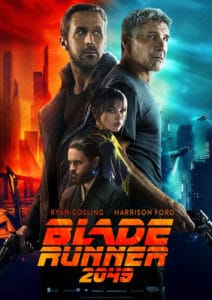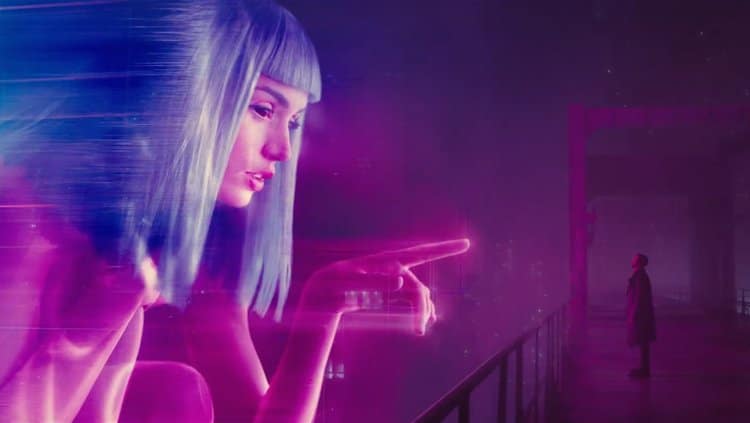I’m not generally comfortable making big sweeping statements about newly released movies. You never know for sure what a film’s legacy is going to be, and whether or not it will really be remembered as time passes. However, in the case of Blade Runner 2049, I feel surprisingly confident in declaring that, in years to come, when people talk about the very best sequels ever made – The Bride of Frankenstein, The Godfather Part II, The Empire Strikes Back – this will also be a film that is mentioned every time. Denis Villeneuve’s belated follow-up to Ridley Scott’s cult classic is an absolute triumph, which not only honours its predecessor and advances the storyworld it created in a compelling and powerful manner, but also tells a brilliant stand-alone story with a captivating new aesthetic all of its own; and crucially, understanding and enjoyment of this does not by any means necessitate familiarity with the original.

Given that this is one instance in which a major blockbuster’s marketing campaign has managed not to give everything away, I’m reticent to go too heavily into the plot, suffice to say that Ryan Gosling is K, a new generation Blade Runner continuing in the not-so noble profession that Harrison Ford’s Deckard begrudgingly pursued in the first movie: hunting down and executing illegal artificially created humans known as Replicants. Of course, given three decades have passed in the film’s timeline (a few more than that in our own timeline, given Blade Runner came out in 1982), the technology has advanced a fair bit, and there’s a whole new generation of legal, seemingly safe Replicants which will do as they’re told and not put up any resistance, as they were always intended to do. However, just as K’s wrapping up his most recent case under the orders of Lieutenant Joshi (Robin Wright), an unexpected discovery leads him down a whole new line of investigation which relates to events from many years previous – i.e., when Deckard was still on the beat. This investigation draws K into the world of all-powerful industrialist Niander Wallace (Jared Leto), creator of the modern Replicant and owner of what remains of their original manufacturer, the Tyrell Corporation. And it’s not giving too much away to say that intrigue and violence ensues.
While Blade Runner 2049 should be perfectly accessible even to those unfamiliar with Blade Runner, interest in the sequel will of course be contingent to a large extent on how one feels about the original. If you found Ridley Scott’s film sterile, over-stylised and too heavy on symbolism, it’s entirely likely that Villeneueve’s will have a similar effect. However, it should be noted straight away that Blade Runner 2049 is by no means beholden to the distinct visual aesthetic of the original. This much is obvious from the very first scene, which – shocker – takes place in broad daylight (well, in smog-heavy air, but daylight nonetheless), something which was notable by its total absence in the original. Nor is the action entirely restricted to overcrowded metropolitan areas: while there are a great many striking shots of cluttered city blocks lit up with gargantuan holographic advertising, we also have numerous key sequences crossing vast, barren landscapes, and delving into rustic industrial sites.
Another key complaint that can, and indeed has been made of Scott’s film, particularly in light of today’s more gender-conscious criticism, is what an outright sausage fest it is. By contrast, Blade Runner 2049 would seem to have made a point of casting women in key roles of power, the most obvious being Robin Wright as Gosling’s boss; between this and Wonder Woman, the Artist Formerly Known as Buttercup has had quite the year for tough and meaty supporting roles. More of a revelation is Sylvia Hoeks as Luv, right-hand woman of Jared Leto’s Wallace, whose initial warmth masks a steely interior; happily, she also gets way more screen time than Leto, whose unsuprisingly eccentric performance (with vocal mannerisms uncannily like those of Jeffrey Combs) threatens to derail things at points, but is thankfully kept reined in enough.

However, the character and plot thread which would seem most likely to inspire debate and potential controversy is Ana de Armas as Joi. I don’t think it’s giving too much away to reveal that she too is a Replicant of sorts; not a physical clone of a human, but rather an artificial intelligence in a holographic form, created specifically to provide companionship for men. As such, she’s a logical extension of both Daryl Hannah and Joanna Cassidy’s ‘pleasure models’ of the original Blade Runner, and the Siris and Alexas of today. Her relationship with K takes up a great many scenes which (particularly given the film’s two and half hour running time) might easily be deemed irrelevant to the main thrust of the plot. However, much as with the original film, Blade Runner 2049’s narrative is ultimately of far less interest than the themes it delves into: chiefly, questions of identity, the validity of emotional responses, and how exactly we define life. This being the case, while I can see how these scenes might slow things down for some viewers, I found them among the most rewarding moments, which I think the film would be considerably worse off without. De Armas and Gosling have a wonderfully understated chemistry, and it doesn’t hurt that the sexual elements are not treated in a creepy, voyeuristic manner (as many would argue was the case in the similarly themed Ex Machina).
When all’s said and done though, there are two main powerhouse performances that drive Blade Runner 2049 – and neither of them is Harrison Ford. Not that there’s anything remotely wrong with the performance from the beloved old curmudgeon with a knack for reprising the signature roles of his youth (after this, Indy and Star Wars, surely a sequel based around Bob Falfa from American Graffiti is the only way forward); he’s every bit the star he ever was, and I wouldn’t be surprised if recent speculation that this could land him a Best Supporting Actor Oscar proves true (although even so, it’ll be one of those ‘better late than never’ ones). No, the real stars of the show in Blade Runner 2049 are cinematographer Roger Deakins – surely the best there is in his field (who astonishingly still doesn’t have an Oscar either), doing staggeringly gorgeous work here – and Ryan Gosling. I must confess I was a little sceptical about Gosling’s casting at first, but as soon as the film began it all made sense. His largely silent roles for Nicolas Winding Refn feel like a dry run for this, as K’s emotional distance makes Deckard seem like a well-rounded new man by comparison. The actors I’ve always most admired are those who are able to ostensibly do very little, yet command your attention at all times, and Gosling – who’s rarely off-screen – maintains this throughout, even when sharing the screen with Ford. As great as his work with Refn is, this is surely Gosling’s best performance yet.
And of course, bravo too to Denis Villeneuve; and thank God (or, I dunno, the Maker or whatever) that Ridley Scott passed on the reins to this particular sequel, considering how badly the elder director screwed the pooch this year with Alien: Covenant. I’m a little ashamed to admit this is actually the first Villeneueve movie I’ve seen, and from this it’s quite clear why he’s held up as one of the best around right now. It takes real skill and real guts to take on a sequel to a movie as revered and influential as Blade Runner; the fact that Villeneuve was also able to craft a film which stands on its own two feet, with an energy, atmosphere and personality all of its own, is truly something to be applauded. More than anything else, with Blade Runner 2049 arriving in the wake of the likes of Logan and It (both of which it is superior to), it’s very encouraging indeed to see that intelligent, adult-oriented big budget genre films have come back in a big way. We can but hope this wave will continue – and if it means more sequels/reboots, then that’s nothing to worry about if they’re even close to being as good as this.
Blade Runner 2049 is in cinemas now.
